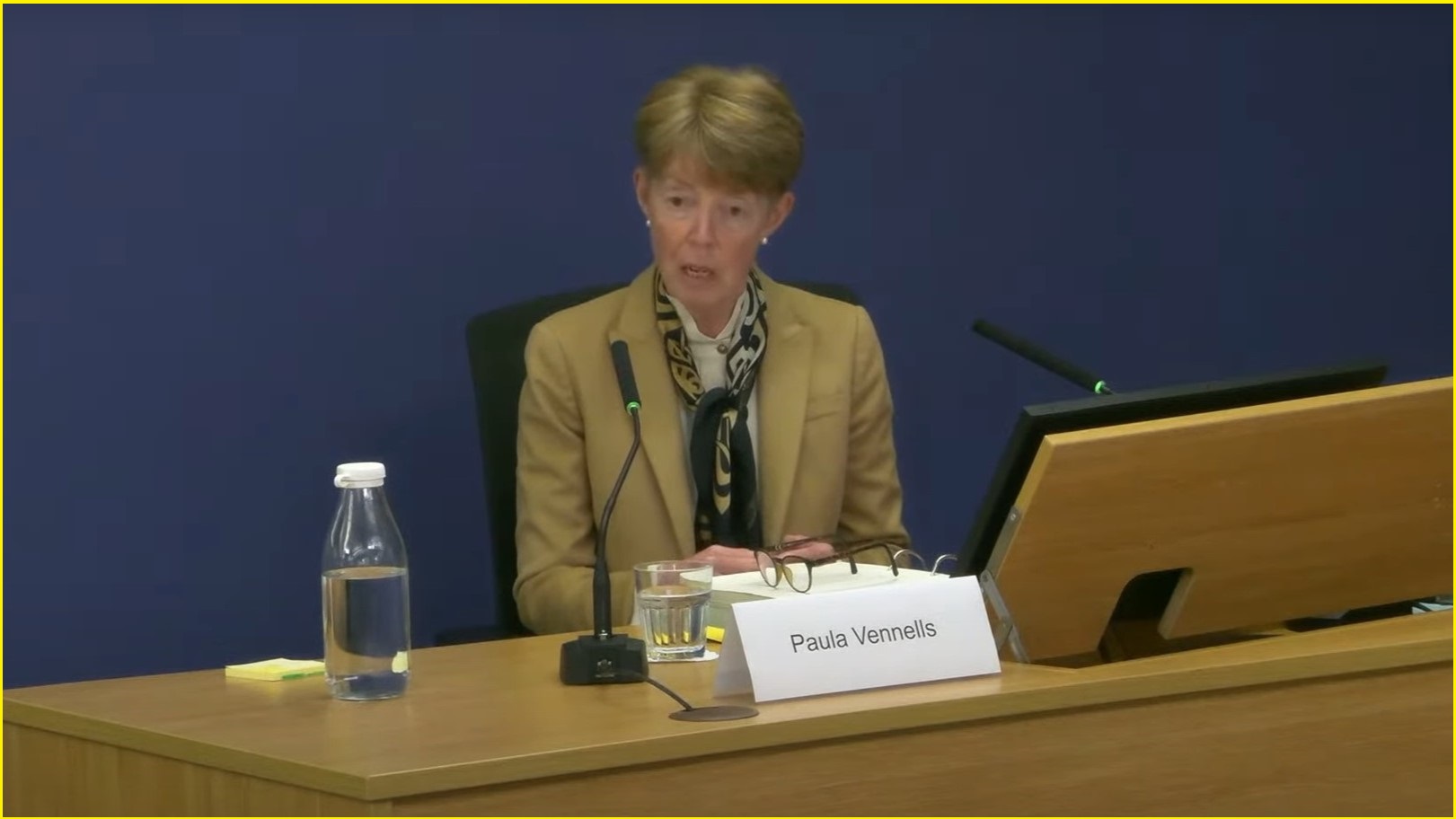The UK Post Office aggressively fought reports of flaws in the company’s Horizon IT system, demanding apologies from media and dismissing subpostmasters’ complaints as “noise”, former CEO Paula Vennells confirmed as three days of testimony concluded.
Vennells – who was appointed managing director of Royal Mail Group in 2010 and CEO of newly formed Post Office Limited (POL) when it was hived off and privatised in 2012 – told the Post Office Horizon IT Inquiry that the company used hardline tactics against former subpostmasters (SPMs) to protect the new company’s reputation.
Before and during her tenure, hundreds of SPMs were prosecuted and – despite their pleas of innocence and requests for technical reviews – wrongly convicted of false accounting, theft, and fraud offences that were later attributed to bugs in the company’s Horizon branch management system created by Fujitsu.
Even where courts had cleared many SPMs, Vennells doubled down, reminding her legal and executive teams that POL’s official stance on the ‘exceptions’ – the word Vennells chose after workshopping less “emotional” euphemisms for ‘bug’ – was to deny them and discredit any negative reports.
“We need to be front foot and counter anything that has a reputational impact,” Vennells wrote to former POL general counsel Susan Crichton, whom the CEO told that “it is a goal of mine that all press, even local press and perhaps especially local press, should be scoured for negative comment and refuted.”
Despite distracted executives’ high-level discussions about growing media reports about the Horizon problems, an email trail suggested that executives were told to toe the company line that the system was “robust”.
Throughout the process, POL’s internal investigations team hounded accused SPMs to make good the losses erroneously generated by the system – often pushing them into situations so intractable that many SPMs were jailed, sold houses, ostracised in their communities, or died by suicide.
Although SPMs were often told that their contract with POL required them to make good what were often tens of thousands of pounds’ worth of losses, Vennells admitted that in truth their contracts – which she trusted because “this was a process that had been in place for many years, and was run by an experienced team” – required no such thing.
“It was a fact within the organisation… that it was the requirement of the contract,” Vennells said before backpedalling to say that she “honestly can’t remember [what the contract required] at the time [and] would have completely relied on the people whose job it was to determine what the contract did or didn’t say, and how it was applied.”
Yet that misunderstanding reinforced the company’s campaign to discredit SPMs, which Vennells doggedly pursued in the public arena despite mounting evidence that information about Horizon’s problems had been buried because it would have “undermined” the prosecutions.
“I certainly demanded apologies where the business felt that it had been misrepresented, and defended Horizon because I had confidence in the system,” Vennells admitted during her testimony, in which she admitted that her actions “were completely unfair in these cases.”
“I regret that hugely now,” she said.
“What I have learned since was that there many other bugs in the system that affected restricted numbers of branches that equally could have been described as anomalies or exceptions – and in fact what these were manifestations of was an instability in the system that I wasn’t aware of.”
Poor governance, little technical understanding
Despite her protestations, Vennells was far from unaware of the system’s issues, which developer Fujitsu was discussing shortly after go-live in the late 1990s and – despite years of being downplayed by that company and Post Office Limited – were common knowledge by the time Vennells took up her mantel as CEO.
So, too, was the understanding that Fujitsu could remotely access and change SPMs’ accounts without their permission or knowledge – a key fact that affected the integrity of the data supporting the prosecutions.
That fact was documented in documents that Vennells said she “didn’t know… existed” at the time.
“That information wasn’t shared,” Vennells said, “deeply regrettably.”
Indeed, Vennells admitted that she “didn’t register” and “didn’t understand the technicality behind” many of the technical aspects of ongoing audits of Horizon, instead accepting reassurances from executives that the system was sound.
“I had no idea at any time that a balancing transaction could have been used in the many ways that it was,” Vennells said.
Yet she and others in her circle well recognised the potential reputational and legal damage from the Horizon revelations, with former POL lawyer Emily Springford warning executives not to write anything critical of POL processes or systems as such documents might be disclosed in subsequent legal proceedings.
That “struck me as an odd thing to say,” Vennells said while admitting that internal processes for tracking Horizon cases – which she had described as “noise” – were also not “good enough”.
“Complaints and issues were raised in numbers of different places across the organisation,” she said, admitting that “the organisation didn’t keep a good enough record on this type of matter.”
Cases were “dealt with and looked at by the experts in the business [and] Fujitsu were involved where they needed to be,” she said, adding that due to the long timeframe in which the cases came through “it may not have seemed to people that there were that many.”
“When you put them together like this, it clearly paints a very different picture and one that we should have been looking at.”
“This could have been done much better.”










